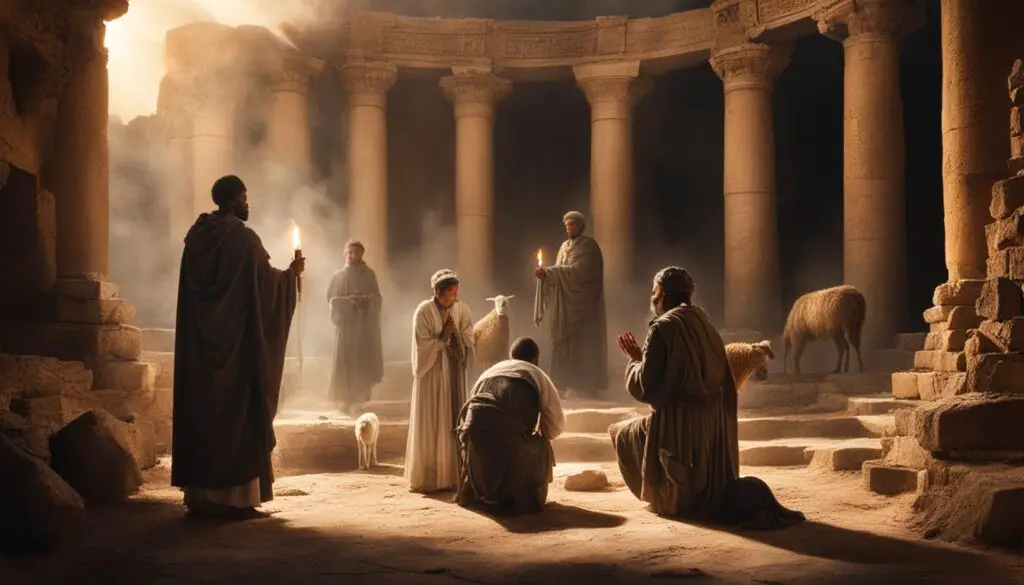Welcome to this deep dive into the practice of intercession in the Old Testament. Discover the power of prayer and the significance of mediation and reconciliation between parties. Intercession in the Old Testament is rooted in God’s decrees and human willingness, requiring individuals to align their hearts with His will through prayer and action. Join us on this journey as we uncover the profound impact of intercession in the biblical narrative.
Key Takeaways:
- Intercession in the Old Testament involves mediation and reconciliation between parties.
- It relies on God’s revealed truth and requires individuals to align their hearts with His will.
- Two Hebrew words, “פלל” and “פגע,” are used to describe intercession in the Old Testament.
- Intercession has the power to bring about mercy, deliverance, and God’s intervention.
- Jesus Christ is the ultimate mediator and intercessor between God and humanity.
Understanding the Biblical Definition of Intercession
In the Old Testament, the act of intercession is of great significance. It involves mediation and reconciliation between parties, both God and individuals. Intercession is rooted in God’s decrees and requires human willingness to align with His will through prayer and action. In the Hebrew Bible, intercession is described using two distinct Hebrew words: “פלל” and “פגע”.
The word “פלל” emphasizes making appeals based on God’s objective truth, seeking His intervention and guidance. It is a form of prayer that relies on God’s revealed truth. On the other hand, the word “פגע” focuses on meeting with individuals and pleading for their reconciliation. It involves intercessors personally engaging with those they are praying for and advocating on their behalf.
Throughout the Old Testament, we find numerous examples of intercession. One such example is Samuel, who served as a mediator for those who sinned against God. Samuel’s intercession demonstrates the role of intercessors in mediating between God and His people. Another notable example is Moses, who interceded on behalf of the Israelites in various situations. His intercession for God’s mercy and forgiveness reveals the power and significance of intercession in the Hebrew Bible.

Biblical Intercession Examples
| Intercessor | Intercession Example |
|---|---|
| Samuel | Mediating for those who sin against God |
| Moses | Interceding for the Israelites in challenging circumstances |
“פלל” emphasizes appeals based on God’s objective truth, while “פגע” focuses on meeting with individuals and pleading for reconciliation.
The biblical examples of intercession in the Old Testament provide insights into the nature and purpose of intercession in the Hebrew Bible. They reveal the importance of aligning with God’s will and seeking His mercy and intervention through prayer. These examples serve as a foundation for understanding the role of intercessors in the Old Testament and the power of intercession in bringing about reconciliation and divine intervention.
The Power of Effective Intercession
In the Old Testament, intercession is not just a passive plea to God, but a powerful act that can shift the course of events and bring about God’s mercy and deliverance. This requires individuals to align their hearts with God’s will and intercede on behalf of others. The role of intercessors, particularly the prophets in the Old Testament, cannot be underestimated in their ability to mediate between God and His people.
Effective intercession in the Old Testament involves seeking reconciliation and agreement between two parties. It requires understanding and aligning with God’s revealed decrees and judgments. The intercessors, such as Abraham and Moses, played a crucial role in mediating between God and His people, pleading for mercy and deliverance. It is through their bold prayers and actions that God’s plans were shifted and His judgment turned into mercy.
The Intercessory Role of Old Testament Prophets
The Old Testament prophets were not only messengers of God’s truth but also intercessors who stood in the gap between God and His people. They were called to mediate and intercede on behalf of the nation, voicing their concerns, seeking God’s forgiveness, and pleading for His mercy. These prophets, like Elijah, Jeremiah, and Isaiah, demonstrated the power of effective intercession in their unwavering commitment to God’s will and their dedication to the well-being of His people.
Table: Old Testament Prophets as Intercessors
| Prophet | Intercessory Role |
|---|---|
| Elijah | Interceded for rain during the drought, for the restoration of a child’s life, and for God’s manifestation on Mount Carmel. |
| Jeremiah | Interceded for God’s mercy and deliverance from Babylonian captivity, despite facing rejection and hardships. |
| Isaiah | Interceded for God’s forgiveness, healing, and restoration of the nation of Israel, even in the face of their rebellion. |
Through their intercessory role, these prophets paved the way for God’s intervention and demonstrated the significance of effective intercession in fulfilling God’s purposes. Their example serves as an encouragement for believers to embrace their role as intercessors and stand in the gap, aligning their hearts with God’s will and praying for the well-being of others.

Intercession in the Old Testament: Powerful Prayers and Ministry
In the Old Testament, intercession played a vital role in the spiritual journey of individuals known as prayer warriors. These dedicated individuals served as mediators between God and His people, interceding on behalf of others. The Old Testament intercessory ministry involved fervent prayers and pleas for reconciliation, forgiveness, and deliverance. Through their intercession, these prayer warriors sought to align themselves with God’s will and bring about His purposes in the lives of others.
One notable example of interceding for others in the Old Testament was Moses. As the leader of the Israelites, Moses frequently interceded on their behalf, seeking God’s mercy and guidance. In Exodus 32, when the Israelites worshiped the golden calf, Moses pleaded for God’s forgiveness and begged Him not to carry out His wrath. This powerful example of intercession showcases the heart of a prayer warrior who seeks the salvation and deliverance of others.
“But now, please forgive their sin—but if not, then blot me out of the book you have written” (Exodus 32:32).
The intercessory ministry in the Old Testament also demonstrated the importance of standing in the gap for others. Abraham, known as the father of faith, interceded for the cities of Sodom and Gomorrah. In Genesis 18, Abraham pleaded with God to spare the cities if righteous people were found. Through his intercession, Abraham displayed deep compassion and a desire for the salvation of others, even in the face of imminent destruction.
Intercession in the Old Testament was not merely a duty but a heartfelt ministry of prayer and intercession. These prayer warriors understood the power of bringing the needs of others before God and actively sought to be vessels of His grace and mercy. Their dedication and selflessness serve as an inspiration for believers today, reminding us of the transformative power of interceding for others.
| Intercessors | Intercessory Ministry |
|---|---|
| Abraham | Interceded for the cities of Sodom and Gomorrah |
| Moses | Interceded for the Israelites, seeking God’s mercy and guidance |
| Samuel | Mediated for those who sinned against God |
The Role of Intercession in Old Testament Stories
Intercession plays a significant role in various Old Testament stories, demonstrating its power and impact on the course of events. These narratives highlight the importance of intercessors who stood in the gap and pleaded with God on behalf of others, showcasing the profound influence of intercession in the lives of individuals and communities.
One such example is found in the story of Abraham interceding for the cities of Sodom and Gomorrah. In Genesis 18, God reveals His plan to destroy the cities due to their wickedness. However, Abraham, deeply concerned for the fate of his nephew Lot and the righteous people in those cities, pleads with God for mercy. In a remarkable dialogue, Abraham boldly presents his petitions, asking if God would spare the cities for the sake of the righteous. Through his intercession, Abraham demonstrates his deep care and love for others, as well as his trust in God’s justice and mercy.
Another powerful example of intercession is seen in the story of Moses and the Israelites. In Exodus 32, after witnessing the Israelites’ idolatry and rebellion, Moses intercedes on their behalf, pleading with God to spare them from His wrath. He appeals to God’s covenant promises and His reputation among the nations, highlighting the potential impact on God’s reputation if He were to destroy His chosen people. Moses’ intercession moves God to relent from His initial intention to destroy the Israelites, showcasing the transformative power of intercession.
These stories serve as powerful reminders of the role of intercession in the Old Testament, revealing how the prayers and pleas of individuals can impact the course of events and bring about God’s grace and intervention in ways beyond human understanding.
| Intercession Story | Intercessor |
|---|---|
| Abraham interceding for Sodom and Gomorrah | Abraham |
| Moses interceding for the Israelites | Moses |
The Connection between Intercession and God’s Promises
Intercession in the Old Testament is intricately linked to God’s promises, as demonstrated by the powerful example of Abraham’s intercession for his nephew Lot. In the face of Sodom’s impending destruction, Abraham pleaded with God to spare the righteous people in the city, including Lot and his family. Abraham’s intercession was rooted in his faith in God’s faithfulness and his desire to see God’s promises fulfilled.
“Will you indeed sweep away the righteous with the wicked? Suppose there are fifty righteous within the city. Will you then sweep away the place and not spare it for the fifty righteous who are in it?” (Genesis 18:23-24)
Abraham’s prayers reveal his deep concern for the welfare of others and his willingness to stand in the gap on their behalf. He understood that God’s promises and His character of justice and mercy were intertwined. Abraham believed that God’s righteousness would not allow the destruction of the righteous along with the wicked. His intercession was an expression of his trust in God’s goodness and His willingness to hear and respond to the prayers of His people.
God’s response to Abraham’s intercession further underscores the connection between intercession and His promises. In their dialogue, Abraham boldly approached God, pleading for mercy and presenting his case with humility and reverence. As their conversation unfolded, Abraham’s petitions and God’s gracious responses showcased the vital role of intercession in aligning human desires with God’s will and bringing about divine intervention.

Through Abraham’s intercession, we see that prayer has the power to not only influence the course of events but also to activate the fulfillment of God’s promises. Abraham’s faith-filled intercession for Lot resulted in God’s assurance of mercy: “I will not destroy it for the sake of ten” (Genesis 18:32). This pivotal interaction between Abraham and God highlights the profound impact of intercession on God’s plans and His faithfulness to His promises.
| Key Points | Insights |
|---|---|
| Abraham’s intercession | Demonstrates the relationship between intercession and God’s promises. |
| God’s response | Reveals His faithfulness and willingness to hear and respond to intercession. |
| Intercession’s impact | Has the power to activate the fulfillment of God’s promises. |
Abraham’s intercession for Lot serves as a timeless reminder of the connection between intercession and God’s promises. It encourages us to approach God with confidence, knowing that our prayers can bring about transformation and align our desires with His purposes. Just as Abraham stood in the gap for others, we too can intercede on behalf of those in need, trusting in God’s faithfulness and the power of prayer to usher in His promises.
The Power of Prayer in Intercession
Intercession is not merely a passive act of asking for divine intervention; it is a powerful practice that can bring about transformation and change. At the heart of intercession lies the power of prayer, through which believers can communicate with God, align their hearts with His will, and participate in His redemptive work. The effectiveness of intercessory prayer lies in its alignment with God’s perfect plan and purposes. When individuals fervently pray according to God’s decrees and align their hearts with His desires, their intercession becomes a catalyst for His intervention and the manifestation of His power.
“The prayer of a righteous person has great power as it is working.” – James 5:16
- Power to Bring Healing: Intercessory prayer has the power to bring physical, emotional, and spiritual healing. It is a channel through which God’s healing grace and restoration can flow into the lives of those in need. As believers intercede for the broken, the sick, and the hurting, they partner with God in His compassionate work of bringing wholeness and restoration.
- Power to Break Strongholds: Intercessory prayer has the power to break spiritual strongholds and demolish the works of darkness. It is through prayer that believers can wage spiritual warfare against the enemy and see the victory of Christ manifested in the lives of individuals, families, communities, and nations.
- Power to Bring Transformation: Intercessory prayer has the power to bring about transformation in the hearts and lives of individuals. As believers intercede for others, they invite the Holy Spirit to work in the hearts of those being prayed for, convicting, shaping, and transforming them into the likeness of Christ.
Intercessory prayer is not limited by time, distance, or circumstance. It transcends human limitations and taps into the supernatural power of God. Through intercession, believers can participate in God’s divine purposes, becoming instruments of His love, mercy, and grace in the lives of others. As they humbly seek His face and earnestly lift up their prayers, they unleash the power of prayer in intercession, witnessing the miraculous and the miraculous working hand of God.
The Power of Prayer in Intercession Table
| Power of Prayer in Intercession | Key Scripture |
|---|---|
| Bringing Healing | James 5:15 – And the prayer of faith will save the one who is sick, and the Lord will raise him up. And if he has committed sins, he will be forgiven. |
| Breaking Strongholds | 2 Corinthians 10:4 – For the weapons of our warfare are not of the flesh but have divine power to destroy strongholds. |
| Bringing Transformation | Romans 12:2 – Do not be conformed to this world, but be transformed by the renewal of your mind, that by testing you may discern what is the will of God, what is good and acceptable and perfect. |

The Intercessory Ministry of Jesus Christ
In the Old Testament, intercession played a significant role in mediating between God and His people. However, it is in the ministry of Jesus Christ that we see the ultimate intercessor and mediator. Jesus bridged the gap between God and humanity through His sacrificial death and resurrection, offering salvation and eternal security to all who believe in Him.
As the ultimate intercessor, Jesus embodies the perfect union of divinity and humanity. He understands our weaknesses and struggles, having experienced them Himself during His time on earth. He can empathize with our pain, our fears, and our deepest desires. Jesus’ intercessory ministry assures us that we have a direct relationship with God, knowing that our prayers are heard and answered.
“For there is one God and one mediator between God and mankind, the man Christ Jesus” (1 Timothy 2:5).
Through His continuous intercession on behalf of believers, Jesus ensures our salvation and eternal security. He constantly advocates for us before the Father, presenting His perfect sacrifice as the basis for our forgiveness and acceptance. Jesus’ intercession brings us into a reconciled relationship with God, allowing us to approach Him with confidence and boldness.
Trusting in Jesus as the ultimate intercessor gives us the assurance of God’s love, grace, and provision. We can rest in His intercessory ministry, knowing that He is always interceding on our behalf. Jesus invites us to cast our burdens upon Him, to bring our needs and concerns before Him in prayer. In Him, we find comfort, strength, and hope, knowing that He is working all things together for our good.

Inspiring Quote
“Therefore he is able to save completely those who come to God through him, because he always lives to intercede for them” (Hebrews 7:25).
Encouragement Through Intercessory Prayer
Intercessory prayer is a powerful tool that not only connects us to God but also has the incredible ability to benefit, bless, and rescue others. When we engage in intercession, we step into a sacred role of standing in the gap for those in need. It is an act of love, concern, and care for others, demonstrating our willingness to carry their burdens and present their needs before the throne of grace.
Through intercessory prayer, we can tap into the supernatural power of God, who is always at work in our lives and the lives of those we pray for. The New Testament encourages believers to pray for one another, knowing that God delights in using prayer to bring about His purposes. As James 5:16 reminds us, “The prayer of a righteous person has great power as it is working.”
“Therefore, confess your sins to one another and pray for one another, that you may be healed. The prayer of a righteous person has great power as it is working.” – James 5:16
As we intercede, we can find encouragement in the knowledge that God hears our prayers and responds according to His perfect wisdom and timing. Even when we may not see immediate results, we can trust that our prayers are not in vain. We are partnering with the One who holds all power and authority, and He is faithful to answer according to His will.
The Power of Prayer for Others
One of the most beautiful aspects of intercessory prayer is the opportunity to witness the transformative work of God in the lives of those we lift up in prayer. We have the privilege of being vessels through which God’s power flows, bringing healing, restoration, and breakthrough to others. Our prayers can make a difference in their lives, bringing comfort in times of distress, guidance in times of confusion, and hope in times of despair.
Intercession also helps us cultivate a heart of love and compassion for others. As we intercede, our focus shifts from ourselves to the needs of those around us. We become more aware of the struggles, pain, and challenges that others face. Intercessory prayer opens our eyes to the bigger picture and allows us to participate in God’s work of redemption and restoration in the lives of those we pray for.
Let us, therefore, be encouraged to continue in the vital practice of intercessory prayer. Let us lift up our loved ones, our communities, and even our enemies, knowing that our prayers have the power to impact lives and bring about profound change. May we never underestimate the influence of a heartfelt prayer offered on behalf of others. Through our prayers, we can bring comfort, healing, and the transformative power of God’s love into the lives of those around us.
Jesus as the Greater Mediator
As we delve into the concept of intercession in the Old Testament, it becomes evident that Jesus Christ is the ultimate mediator and intercessor. His role goes beyond just bridging the gap between God and humanity; it encompasses the salvation and eternal security of believers. Jesus’ sacrificial death on the cross serves as the foundation of His intercessory ministry, offering forgiveness, redemption, and eternal life to all who believe in Him.
Jesus’ unique position as the Greater Mediator provides believers with the assurance of God’s love, grace, and provision. Through His intercession, He secures our relationship with God, ensuring that our prayers are heard and answered according to God’s will. Jesus stands as the perfect link between God and humanity, allowing us to approach God with confidence and receive His mercy and blessings.
Jesus’ role in mediating between God and humanity encompasses not only His past work on the cross but also His continuous intercession on behalf of believers. Hebrews 7:25 affirms, “He is able to save completely those who come to God through him because he always lives to intercede for them.” This powerful truth reminds us of the unwavering commitment of Jesus to intercede for us, ensuring our salvation and eternal security.
The Power of Jesus’ Intercession
The intercessory ministry of Jesus is not limited by time or location. He is always present, always interceding on behalf of those who come to God through Him. This divine intervention and advocacy provide comfort, strength, and hope to believers, knowing that Jesus understands our needs and presents them before God the Father.
Jesus’ intercession has the power to transform lives, heal relationships, and bring about divine intervention in our circumstances. Through His intercession, we experience the fullness of God’s love and grace, experiencing His unfailing faithfulness and provision. Jesus as the Greater Intercessor invites us to bring our needs, concerns, and desires to Him, knowing that He will present them before the Father and intercede on our behalf.
| Benefits of Jesus’ Intercession | Scripture References |
|---|---|
| Salvation and forgiveness of sins | Ephesians 1:7 |
| Access to God’s presence | Ephesians 2:18 |
| Victory over sin and temptation | Hebrews 4:15-16 |
| Divine guidance and direction | John 14:26 |
| Provision and blessings | Philippians 4:19 |
| Comfort and peace | John 14:27 |
Conclusion
As we delve into the realm of intercession in the Old Testament, it becomes evident that prayer holds immense power in aligning with God’s will and bringing forth His divine purposes. From the intercessory examples of Abraham and Moses, we witness the profound significance of standing in the gap for others and pleading for mercy and deliverance.
Yet, amidst all the stories and accounts, we must never forget that Jesus Christ stands as the ultimate Mediator and Intercessor. Through His sacrificial death and resurrection, He bridged the gap between God and humanity, offering salvation and eternal security to all who trust in Him.
As believers, we are called to continue interceding for others, knowing that our prayers have the potential to benefit, bless, and rescue those around us. Our faith is anchored in God’s faithfulness, and we can rest assured that He delights in using intercessory prayer to bring about His purposes and demonstrate His love and grace.
So, let us embrace the power of intercession and the gift of prayer. In the tapestry of the Old Testament, we uncover the beauty of God’s faithfulness and the transformative impact of intercessory prayer. May we continue to intercede fervently, trusting in God’s unwavering love and the profound effectiveness of prayer.
FAQ
What is intercession in the Old Testament?
Intercession in the Old Testament is a practice involving mediation and reconciliation between parties based on God’s decrees and human willingness.
How is intercession described in the Old Testament?
The Old Testament uses two Hebrew words, “פלל” and “פגע,” to describe intercession. The first word emphasizes making appeals based on God’s objective truth, while the second word focuses on meeting with individuals and pleading for reconciliation.
Who are some examples of intercessors in the Old Testament?
Examples of intercessors in the Old Testament include Samuel, who mediated for those who sin against God, and Moses, who interceded for the Israelites.
What is the power of effective intercession?
Effective intercession seeks to reconcile two parties and requires God’s revealed decrees and judgments. It has the power to shift God’s plans, result in mercy and deliverance, and bring about change.
How does intercession play a role in Old Testament stories?
Intercession plays a significant role in Old Testament stories, where individuals like Abraham and Moses prayed and pleaded to God for mercy and deliverance, impacting the course of events and bringing about God’s grace and intervention.
What is the connection between intercession and God’s promises?
Intercession is closely tied to God’s promises. Abraham’s intercession for his nephew Lot in the face of Sodom’s destruction showcases the relationship between intercession and God’s faithfulness, as his prayers demonstrated trust in God’s promises.
How powerful is prayer in intercession?
Prayer is a powerful tool in intercession, as it involves earnest supplication and seeking God’s intervention and guidance. When individuals align their prayers with God’s will, their intercession can have a significant impact, bringing about change, mercy, and deliverance.
Who is the ultimate intercessor in the New Testament?
Jesus Christ is the ultimate intercessor in the New Testament. Through His sacrificial death and resurrection, He bridged the gap between God and humanity, offering salvation, forgiveness, and eternal life.
How should believers be encouraged in intercessory prayer?
Believers should be encouraged to engage in intercessory prayer, expressing love, concern, and care for others. Trusting in God’s faithfulness and the power of prayer, intercession can bring about His purposes and blessings.
What is the role of Jesus Christ as the Greater Mediator?
Jesus Christ is the Greater Mediator, providing a direct relationship between God and humanity through His intercessory ministry. By trusting in Jesus, believers can experience God’s love, grace, and provision.








